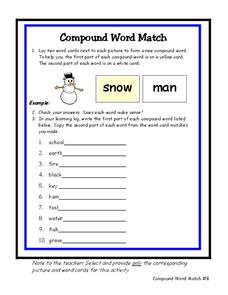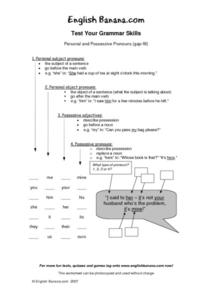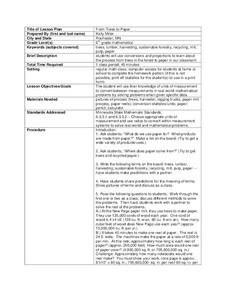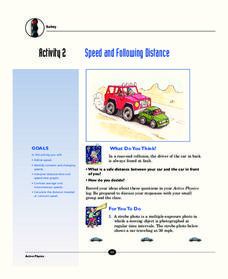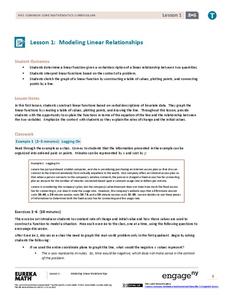It's About Time
Reflected Light
The lesson allows young scientists to use lasers and mirrors to study reflected light. A reading passage and homework question assess learning, while additional material introduces extension activities.
It's About Time
Curved Mirrors
Discover concave and convex mirrors using a laser light. Scholars experiment with real and virtual images before reading a handout and completing homework questions. Included extensions greatly benefit learners, so take advantage of the...
It's About Time
Refraction of Light
Don't shine like a diamond, refract light like a diamond. Young scientists use an acrylic block and a laser light to observe refraction. Advanced scholars figure the sine of the angles of reflection and incidence as well as mastering...
Carl's Corner
Compound Word Match
Compound words are the focus objective of the worksheet. Learners match the first and second part of each word that is written on index cards, along with the corresponding picture. Children develop 10 compound words that are listed on...
Curated OER
Edgar Allan Poe Short Story WebQuest
Introduce your class to Edgar Allan Poe with a series of mostly self-guided tasks and assignments. Class members follow the list of tasks, starting by watching a video with background information and ending with a compare-and-contrast...
Curated OER
Complex Analysis: Homework Set 5: Domain
In this domain learning exercise, students determine the domain of analyticity for given functions. This one-page learning exercise contains five multi-step equations.
Scholastic
Study Jams! Animal Life Cycles
Only five slides, but worth the while for introducing upper-elementary zoologists to different animal life cycles. Two types of metamorphoses are explained: complete and incomplete. Stunning photography flows before the eyes of the...
Scholastic
Study Jams! Muscular System
A professionally created set of slides strengthens viewers' knowledge of the muscular system. Some slides display microscope enlargements of muscle fibers and neurons, while others are beautifully detailed graphic images. The difference...
Curated OER
Two Digit Subtraction Worksheet - No Regrouping
What a neat way to practice math, save this link and save trees. Learners are provided with 6 worksheet that can be completed on the computer. Each sheet contains 12 double-digit subtraction problems that may require regrouping to...
English Banana
Test Your Grammar Skills: Personal and Possessive Pronouns (gap-fill)
Practice personal and possessive pronouns by filling in the blanks. Learners are given information about different types of pronouns and can use that information to fill out the instructional activity. Arrows help to clarify what...
Curated OER
Research Skills: Evaluating Information and Sources
While this focuses on Ancient Rome, the objectives are improved research and information evaluation skills. In one class period, class members narrow their topic, research it, select the best information, log useful sources, and discuss...
Curated OER
Using Foundation Piecing to Create Quilt Blocks
Students create a log cabin pattern quilt block inspired by an antique silk quilt in the Shelburne Museum. They choose a color scheme and practice the basic technique of foundation piecing. After they complete a quilt block they remove...
Curated OER
From Trees to Paper
Sixth graders investigate logging and the process of paper making. In this forestry lesson, 6th graders analyze pictures of trees being processed into the paper they use everyday. Students solve and create math problems based on...
New Zealand Ministry of Education
Fraction Bar
Computing class members encounter use a digital learning tool called The Fraction Bar to multiply fractions with whole numbers. They do so by finding a given fraction of a number either on a number line or by calculating the answer with...
NOAA
A Day in the Life of an Ocean Explorer
What's life like aboard an ocean exploration vessel? Junior oceanographers examine the important role of communication in ocean research in lesson two of a five-part series from NOAA. The materials introduce the class to life on board...
It's About Time
Speed and Following Distance
How much distance should you keep between your car and the one in front of you? Did you think of an answer in terms of time when the question clearly stated distance? The lesson covers the relationship between distance, time, and speed....
It's About Time
Life (and Fewer Deaths) After Seat Belts
Seat belts reduce serious crash-related injuries and deaths by about half. Scholars continue crashing their cart with a crash test dummy into a wall, but this time, they experiment with different types of seat belts to reduce injuries....
It's About Time
The Rear End Collision
Did you know one in every four car crashes are rear end collisions? The lesson explains what happens to your neck when you are involved in a rear end collision. Scholars experiment and apply Newton's Second Law of Motion.
It's About Time
Newton's Law of Universal Gravitation
While science is looking for correct explanations, pseudoscience often fills in the blanks. Pupils explore the relationship between light distance and intensity and graph their data. Then they compare their data to Newton's Law of...
It's About Time
Speedy Light
We know the speed of light, but can we measure the speed of dark? During the lesson, scholars perform gedanken, or thought experiments related to the speed of sound and the speed of light.
It's About Time
The Doppler Effect
In 1842, Christian Doppler proposed a theory relating the change of wavelengths based on motion. Young scholars observe the Doppler Effect on a small scale in a ball, on a larger scale from a car, and on the largest scale studying the...
It's About Time
Accidents
Did you know that cars weren't designed for passenger safety until the 1960s? The lesson starts with a quick quiz on automobile safety. Then, scholars evaluate three cars for their safety features. This is the third in a set of nine...
EngageNY
Modeling Linear Relationships
Math modeling is made easy with the first installment of a 16-part module that teaches pupils to model real-world situations as linear relationships. They create graphs, tables of values, and equations given verbal descriptions.
It's About Time
Response Time
How fast are your reactions in the case of an emergency? Young scholars complete many activities including: time estimation, building a circuit, multiple reaction time experiments, and graphing.





